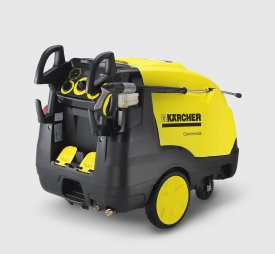A high-performance polypropylene (PP) resin from LyondellBasell Industries has been selected for the production of a new series of industrial cleaning equipment by Alfred Kärcher GmbH & Co. KG, the world's leading producer of cleaning equipment. Moplen EP240T is being used to produce the chassis of the company's new midclass and high-end range of hot water high-pressure cleaners.
 A Moplen EP240T polypropylene resin from LyondellBasell has been selected for the production of a new series of industrial cleaning equipment by Alfred Kärcher GmbH & Co. KG, the world’s leading producer of cleaning equipment. Moplen EP240T is being used to produce the chassis of the company’s new midclass and high-end range of hot water high-pressure cleaners. The chassis represents Kärcher’s first use of a polymer in the application, which traditionally has been produced using steel.
A Moplen EP240T polypropylene resin from LyondellBasell has been selected for the production of a new series of industrial cleaning equipment by Alfred Kärcher GmbH & Co. KG, the world’s leading producer of cleaning equipment. Moplen EP240T is being used to produce the chassis of the company’s new midclass and high-end range of hot water high-pressure cleaners. The chassis represents Kärcher’s first use of a polymer in the application, which traditionally has been produced using steel.
The new chassis represents Kärcher's first use of a polymer in the application, which traditionally has been produced using steel. Compared to standard PP resins, Moplen EP240T offers a unique balance of advanced mechanical properties, including high flowability, impact strength and chemical resistance. Kärcher's cleaning equipment is used to clean automotive engines, agricultural and industrial machinery and therefore the cleaner application required a resin that could stand up to the rigors of outdoor environments.
From steel to plastics
As a load-bearing element for the cleaner, the chassis features very complex geometry that includes more than 300 pieces; the part is 1254 mm long, 747 mm wide, 495 mm high and weighs 22 kg. "Our new model required a material that permitted more design freedom and production flexibility than steel," said Bernd Gaßmann, Process Coordinator at Kärcher. "By using Moplen EP240T, we were able to eliminate several manufacturing steps, and the outstanding processability of the material enabled us to include parts such as the air duct and the holding tanks for water and detergents directly into the chassis instead of assembling these parts in a separate manufacturing step."
Moplen EP240T resin, which meets Kärcher's demanding requirements for the finished parts, is being used to produce six models in the series. "The PP resin from LyondellBasell has already proven its suitability in a variety of other Kärcher applications, due to its outstanding melt-flow rate (MFR), impact resistance and stiffness required for demanding applications such as industrial cleaners," said Gaßmann.
Outstanding flowability
Standard PP grades with a comparable balance of stiffness and impact resistance have a MFR of up to 25 g/10min, while Moplen EP240T has a MFR of 48 g/10min. "Flowability on the one hand, with stiffness and impact resistance on the other hand are diametrically opposing forces. However, the Moplen resin offers an ideal balance of both," said Daniel Schneider, Application Development and Technical Service Manager for Injection Molding at LyondellBasell. "Kärcher also required high chemical resistance, and PP can address this specific need of applications for exterior use."
The manufacturing process at Kärcher also required a resin with improved weldability. "Kärcher uses the latest infrared-welding technology, and due to the well balanced polymer structure, Moplen EP240T is suitable for this processing method," added Schneider.
Before the cleaner entered mass production, the Moplen grade had to pass Kärcher's numerous stringent test methods. "As a producer of high-end units, the materials we use must withstand challenging tests," added Gaßmann. "Moplen EP240T PP resin delivered good results in terms of elongation, impact resistance at -20°C, and density. By using the lowest-density polymer available, we were able to save costs."
"This application success clearly illustrates PP's ability to continuously deliver innovative and versatile solutions," said Paul Turner, vice president of LyondellBasell's polypropylene business in Europe.
Worldwide leading manufacturer of cleaning equipment
The world's largest cleaning equipment manufacturer, Kärcher is a family-owned company that sold 6.38 million units in 2008. In the same year, Kärcher relaunched its benchmark midclass and high-end range of hot water high-pressure cleaners.
According to Gaßmann, "We are very excited about the potential of this new and improved cleaner. The unit meets specific consumer needs for all uses, and thanks to the number of innovations realized in the application, our relaunched series has become the benchmark in terms of cleaning performance, mobility and environmental protection."